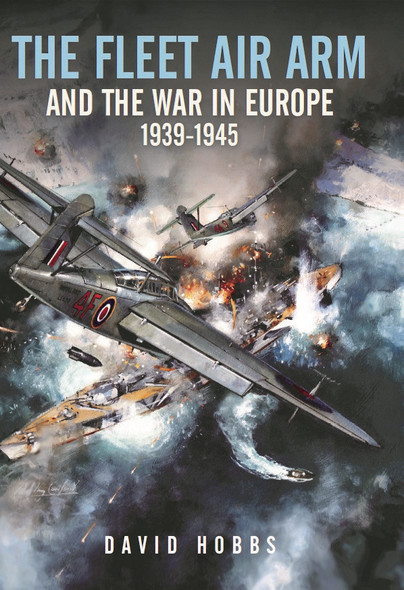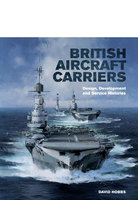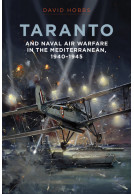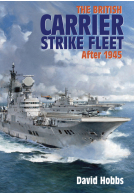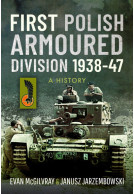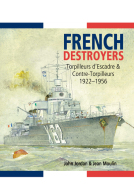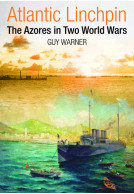The Fleet Air Arm and the War in Europe, 1939–1945 (Hardback)

Pages: 352
Illustrations: 140 mono illustrations
ISBN: 9781526799791
Published: 31st January 2022
(click here for international delivery rates)
Order within the next 2 hours, 12 minutes to get your order processed the next working day!
Need a currency converter? Check XE.com for live rates
| Other formats available | Price |
|---|---|
| The Fleet Air Arm and the War… ePub (84.1 MB) Add to Basket | £16.99 |
For the first time, this book tells the story of how naval air operations evolved into a vital element of the Royal Navy’s ability to fight a three-dimensional war against both the Kriegsmarine and Luftwaffe. An integral part of RN, the Fleet Air Arm was not a large organisation, with only 406 pilots and 232 front-line aircraft available for operations in September 1939. Nevertheless, its impact far outweighed its numbers – it was an RN fighter that shot down the first enemy aircraft of the war, and an RN pilot was the first British fighter 'ace' with 5 or more kills. The Fleet Air Arm’s rollcall of achievements in northern waters went on to include the Norwegian Campaign, the crippling of Bismarck, the gallant sortie against Scharnhorst and Gneisenau as they passed through the Channel, air attacks on enemy E-boats in the narrow seas, air cover for the Russian convoys, air attacks that disabled Tirpitz, and strikes and minelaying operations against German shipping in the Norwegian littoral that continued until May 1945. By the end of the war in Europe the FAA had grown to 3243 pilots and 1336 aircraft.
This book sets all these varied actions within their proper naval context and both technical and tactical aspects are explained with 'thumb-nail' descriptions of aircraft, their weapons and avionics. Cross reference with the Fleet Air Arm Roll of Honour has been made for the first time to put names to those aircrew killed in action wherever possible as a mark of respect for their determination against enemy forces on, above and below the sea surface which more often than not outnumbered them.
The Fleet Air Arm and the War in Europe completes David Hobbs’ much-praised six-volume series chronicling the operational history of British naval aviation from the earliest days to the present.
Listed as one of the ‘Books of the Week’.
Navy Books - Friday 31st January 2025
"In this masterly addition to his series on the Fleet Air Arm at war, David Hobbs addresses naval air operations in the Atlantic, the North Sea, the Arctic, and the English Channel."
Warship Annual - 2023
"In this masterly addition to his series on the Fleet Air Arm at war, David Hobbs addresses naval air operations in the Atlantic, the North Sea, the Arctic and the English Channel".
Professor Andrew Lambert - Warship 2023
Highly Recommended
Naval Review
Read the Full Review Here
"As well as being a great read the book is well illustrated with contemporary WWII photographs."
AeroModeller 1029 - February 2023
"A well written book with plenty of detail for naval historians."
Aviation World - Summer 2022
David Hobbs has produced a thoroughly comprehensive and meticulously researched book about the activities of Fleet Air Arm operations in the European theatre during the Second World War. It contains technical information about the types of aircraft flown by the Fleet air Arm as well as brief biographical details of aircrews. The author as a fitting tribute specifically mentions those who lost their lives. Explanation is provided about the operations undertaken by the Home Fleet and the Fleet Air Arm which have over time faded from public memory.
The Wessex Branch of the Western Front Association
The author has not shied away from criticising interservice rivalry and dithering by the government to comprehend the latent power of the Fleet Air Arm for their ability to combat U-boats, surface craft and the Luftwaffe. The author gives his considered and thoughtful reflections about the Fleet Air Arm during the war and the importance of aircraft carriers as a global deterrent in the twenty-first century. Accompanying the text are black and white photographs, maps, notes, a bibliography, and index. This book is an exceptional and absorbing narrative of naval air operations. It is also a memorable tribute to all those who during the Second World War fought and died in the service of the Royal Navy and Fleet Air Arm.
Reviewer: Roger Coleman
This is a very interesting version of the FAA’s history to read, and it is very well presented. It is full of highly comprehensive information and must have taken a huge amount of time to research. It will undoubtedly become one of the key reference books and one of the most important works on the history of the FAA during the Second World War.
Dr Stuart C Blank, Military Archive Research
"David Hobbs has delivered a most comprehensive and well-researched account of FAA activities in northern European waters, illuminated throughout with a huge selection of photographs, many of them from his own collection. Produced to a high standard by Seaforth, this volume provides a fitting conclusion to his six-volume history of British naval aviation."
Society of Friends of the Fleet Air Arm
As with other books from this author, this one is excellent and must for anyone interested in naval aviation or if you just want a really good factual read and history lesson thrown in.
Richard K Parkhurst, IPMS Portsmouth
Very Highly recommended
"With lots of action it rattles along and is a very good read."
The Armourer Magazine, May 2022
Featured as BOOK OF THE MONTH in
Ships Monthly
This is a cracking new book by David Hobbs, telling the story of the Fleet Air Arm, the impact of which went contrary to its numbers. It had around 406 pilots. And 232 front line aircraft ready for operations in 1939. By the end of World War Two, it had expanded to over 3000 pilots and over 1,000 aircraft. But the role of Royal Navy pilots was to be a continued crucial factor throughout the war. Key elements. of the Air Arms role throughout the war included the Norway Campaign, the crippling of the Bismarck, the sorties. Against the Scharnhorst and Gneisenau in the channel.
Jon Sandison
They are frankly far too numerous to mention, running as they do from the start to the finish of the war, but the serious student should be reassured to know that they are well covered in detail in this exceedingly well-researched book.
Arrse
Read the full review here
This book is part of a series of six, I was lucky enough to get to read his last book Taranto, and together with this book, I’ve just finished reading it is a very fine book and written with so much detail and comprehensive detail. These books are certainly ones to treasure as they are not just written by people who know the ‘knowledge’ of the subject, but they have lived their subject and been a part of it, which cements the brilliant knowledge being written. David Hobbs is a 30 year veteran of the Royal Navy serving as a pilot, and later became the curator of the Fleet Air Arm Museum.
The History Fella
The book explains various aspects of the Royal Navy from the planes used, the ships used, the special operations carried out along with the weapons, dynamics and strategies. It does all this very well by writing it in chapters dedicated to each year of the war. I also enjoyed the good retrospective section in the back which preceded the bibliography and the very detailed notes section. The book also contains a large number of good b/w photographs throughout. I really enjoyed this book and would happily recommend it to others and it’s nice to see more books being written in this way about the Navy.
Read the full review here
As featured in
Aeroplane Monthly
As Featured In
Scramble 1940, Spring/Summer 2022
Superb account of the involvement of the Fleet Air Arm in the early days of the second world war. This is a subject that has not previously been tackled to much extent, and fills in an enormous gap in the retelling of the organisation's development and contribution to the war effort.
Books Monthly
"The Fleet Air Arm and the War in Europe 1939 – 1945 is a necessary addition to any serious aviation history library."
Australian Naval Institute
Read the review here
This is a very comprehensive book written by an ex Naval pilot who served over thirty years flying both fixed and rotary wing eventually becoming curator of the Fleet air arm Museum. This publication covers the Fleet Air Arm from 1939 until 1945 telling the story of how Naval air operations evolved to fight the war against the Kreigsmarine and the Luftwaffe along with all the varied actions in which they were involved. Technical and tactical aspects are explained along with thumbnail descriptions of the aircraft and their weapons and avionics. The book begins in a standard format with a foreword, acknowledgments and glossary and then continues onto the various chapters (10 in all) covering in chapter one, an introduction to the state of the Fleet Air Arm in 1939. Chapter 2 is about the structure and the available ships, weapons and aircraft along with airfields used and details of training. Chapter 3 covers the first two weeks of the conflict in 1939, losses and available aircraft. Chapters 4 through 9 detail each year individually from 1940 through to 1945 with Chapter 10 being a ‘Retrospection’ i.e. looking back on the events that had taken place. The book finishes with Notes, a bibliography and finally the index. An excellent and thoroughly detailed history of the FAA during this period.
Andrew Thomson, IPMS Keighley
David Hobbs writes excellent books recording the history of naval aviation. This new work, “describes the operations of naval aircraft from aircraft carriers of the Home Fleet and from airfields ashore in the European theatre of operations between September 1939 and May 1945”
Battle of Britain Memorial Trust website
"Informative, readable and accessible."
The Royal Navy’s Fleet Air Arm played a crucial role in so many significant actions during the war. Hobbs has already written about their role in the Mediterranean and the Pacific during the war, so this volume completes the picture.
WW2 Today
Once again he has produced a highly readable account that places Royal Naval air operations in their proper context - technical, tactical and strategic - without neglecting the human story. A series of challenging episodes - Norway, Bismarck, the convoy battles, Tirpitz - have been thoroughly researched from a variety of sources. An excellent narrative history that will be a must read for naval aviation enthusiasts but also appreciated by a wider audience.
Read the full review here
About David Hobbs
DAVID HOBBS, after serving in the Royal Navy as a pilot for thirty-three years became the Curator of the Fleet Air Arm Museum for a further eight. Since then he has established himself as an authoritative writer and lecturer on naval aviation topics in the UK, Australia, France and the USA and has more than twenty highly regarded books to his name. The most recent of these was The Fleet Air Arm and the War in Europe 1939-1945 published by Seaforth in 2022.







